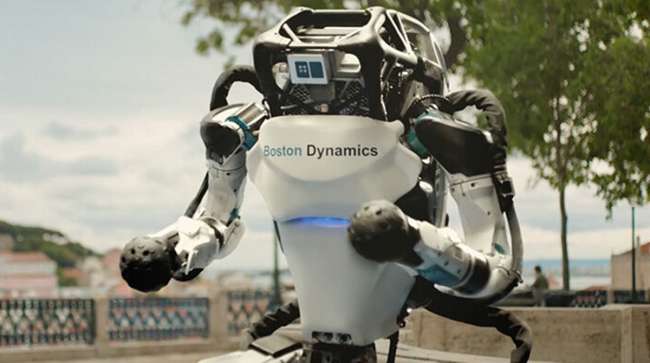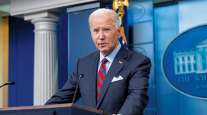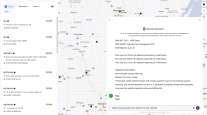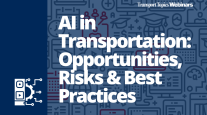Toyota Joins With Boston Dynamics on AI-Powered Robots

[Stay on top of transportation news: Get TTNews in your inbox.]
Toyota Motor Corp.’s research unit and Hyundai Motor Co.’s Boston Dynamics are joining forces to speed up development of humanoid robots with artificial intelligence.
The partnership will pair Toyota Research Institute’s expertise in large behavior model learning for machines with Boston Dynamics’ humanoid Atlas robot, they said Oct. 16. Boston-based teams from TRI and Boston Dynamics will conduct research on use cases for AI-trained robots in areas such as human-robot interaction, they said.
Toyota has said it’s made a breakthrough with AI in teaching robots to learn and Boston Dynamics, which was bought by Hyundai in 2020, has had commercial success with its robotic guard dog and a mobile robotic arm for re-stocking warehouses. Their collaboration comes as a potential challenge to other smart bot programs such as the Optimus robot showcased last week by rival Tesla Inc. A number of humanoid robot startups also are attracting attention — and billions of dollars in capital.
The cooperation between Toyota and Boston Dynamics will focus on fundamental research with an eye toward eventual commercial use but executives at the companies declined to specify a timeline or disclose their budgets for the project.
“This kind of technology has tremendous promise for the future,” Gill Pratt, Toyota’s chief scientist, said in an interview. “The work that we’re doing in generative AI can be a tremendous complement to the kind of work that Boston Dynamics has done.”
Pratt said that a goal is to eventually bring robots onto factory assembly lines and into homes for elder care.
Carmakers have been at the vanguard of efforts to automate more assembly line processes to trim labor costs and bolster worker safety. The automotive industry is second only to electronics manufacturers in deploying robots in factories globally, with about one-quarter of new installations in 2022, the latest data available, according to the Frankfurt-based International Federation of Robotics.
The dexterity of Boston Dynamics robots paired with Toyota’s behavioral know-how is a key differentiator with other companies’ efforts to build smart robots, Aaron Saunders, Boston Dynamics’ chief technology officer, told Bloomberg.
Boston Dynamics and Toyota Research Institute
“That’s going to set the stage to deliver on the promise that a lot of people are making right now in bringing humanoid robots out to the world at scale,” he said.
Saunders said Boston Dynamics plans to deploy humanoid robots with narrowly focused tasks in Hyundai factories “in the coming years” while it pursues research with Toyota on the longer-term objective of AI-enabled, multi-tasking robots.
Hyundai, which already has a pilot program with Boston Dynamics technology at a Kia brand car plant in South Korea, bought a controlling 80% stake in the company from Japan’s SoftBank Group Corp., which retained the rest.
Want more news? Listen to today's daily briefing above or go here for more info
Generative AI holds the promise of allowing robots to adopt new skill sets more quickly based on learned behavior. Much like virtual assistance programs such as ChatGPT have evolved from large language models, large behavioral models are being used to program robots.
Toyota Research Institute is experimenting with large behavioral models to enable a robot to do multiple tasks. The goal is for a robot programmed to beat eggs to also be able to handle any number of other things, like folding a shirt, said Russ Tedrake, an MIT professor and TRI’s head of robotics research.
“We’re well on our way on that,” Tedrake said. “It’s something we’re working very quickly on, very aggressively on, in trying to show that new capability.”




